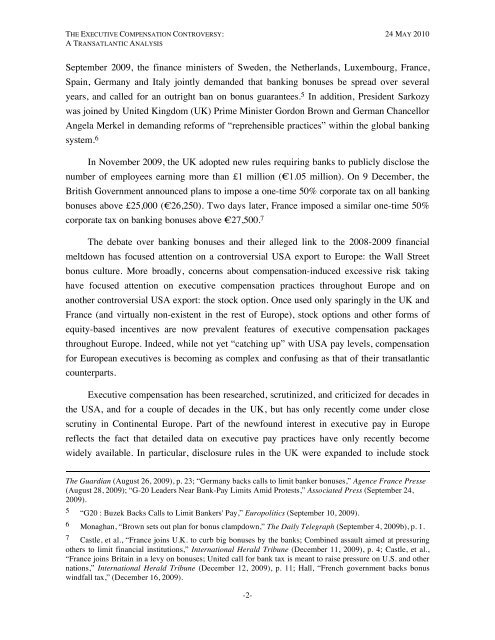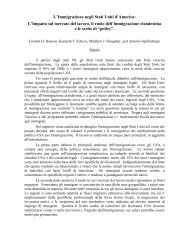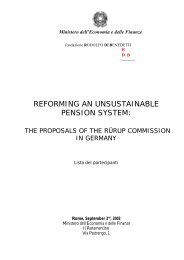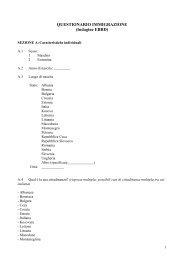The Executive Compensation Controversy - Fondazione Rodolfo ...
The Executive Compensation Controversy - Fondazione Rodolfo ...
The Executive Compensation Controversy - Fondazione Rodolfo ...
You also want an ePaper? Increase the reach of your titles
YUMPU automatically turns print PDFs into web optimized ePapers that Google loves.
THE EXECUTIVE COMPENSATION CONTROVERSY: 24 MAY 2010A TRANSATLANTIC ANALYSISSeptember 2009, the finance ministers of Sweden, the Netherlands, Luxembourg, France,Spain, Germany and Italy jointly demanded that banking bonuses be spread over severalyears, and called for an outright ban on bonus guarantees. 5 In addition, President Sarkozywas joined by United Kingdom (UK) Prime Minister Gordon Brown and German ChancellorAngela Merkel in demanding reforms of “reprehensible practices” within the global bankingsystem. 6In November 2009, the UK adopted new rules requiring banks to publicly disclose thenumber of employees earning more than £1 million (€1.05 million). On 9 December, theBritish Government announced plans to impose a one-time 50% corporate tax on all bankingbonuses above £25,000 (€26,250). Two days later, France imposed a similar one-time 50%corporate tax on banking bonuses above €27,500. 7<strong>The</strong> debate over banking bonuses and their alleged link to the 2008-2009 financialmeltdown has focused attention on a controversial USA export to Europe: the Wall Streetbonus culture. More broadly, concerns about compensation-induced excessive risk takinghave focused attention on executive compensation practices throughout Europe and onanother controversial USA export: the stock option. Once used only sparingly in the UK andFrance (and virtually non-existent in the rest of Europe), stock options and other forms ofequity-based incentives are now prevalent features of executive compensation packagesthroughout Europe. Indeed, while not yet “catching up” with USA pay levels, compensationfor European executives is becoming as complex and confusing as that of their transatlanticcounterparts.<strong>Executive</strong> compensation has been researched, scrutinized, and criticized for decades inthe USA, and for a couple of decades in the UK, but has only recently come under closescrutiny in Continental Europe. Part of the newfound interest in executive pay in Europereflects the fact that detailed data on executive pay practices have only recently becomewidely available. In particular, disclosure rules in the UK were expanded to include stock<strong>The</strong> Guardian (August 26, 2009), p. 23; “Germany backs calls to limit banker bonuses,” Agence France Presse(August 28, 2009); “G-20 Leaders Near Bank-Pay Limits Amid Protests,” Associated Press (September 24,2009).5 “G20 : Buzek Backs Calls to Limit Bankers' Pay,” Europolitics (September 10, 2009).6 Monaghan, “Brown sets out plan for bonus clampdown,” <strong>The</strong> Daily Telegraph (September 4, 2009b), p. 1.7 Castle, et al., “France joins U.K. to curb big bonuses by the banks; Combined assault aimed at pressuringothers to limit financial institutions,” International Herald Tribune (December 11, 2009), p. 4; Castle, et al.,“France joins Britain in a levy on bonuses; United call for bank tax is meant to raise pressure on U.S. and othernations,” International Herald Tribune (December 12, 2009), p. 11; Hall, “French government backs bonuswindfall tax,” (December 16, 2009).-2-









